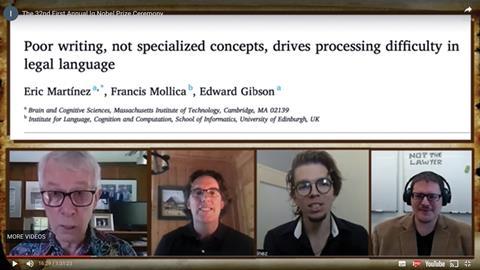Legal contracts are renowned for being impenetrable to most people. That’s why we need lawyers, of course.
But new research suggests it might not be the legalese or readers’ lack of legal knowledge that is the problem. Instead, academics have identified what they described as ‘working-memory limitations imposed by long-distance syntactic dependencies’. Or to put more succinctly, poor writing.
The paper in question, ‘Poor Writing, Not Specialized Concepts, Drives Processing Difficulty in Legal Language’, prepared by experts in brain and cognitive science experts from the Massachusetts Institute of Technology and University of Edinburgh, opens with the suggestion that contracts remain ‘notoriously inaccessible’ to lay people. Online service agreements, the report suggests, are at once ubiquitous and impenetrable, read by virtually everyone yet understood by seemingly no-one except lawyers.
Difficult-to-process features the researchers identified include jargon, centre-embedded clauses, passive voice structures and non-standard capitalisation. The paper says that efforts to simplify legal language over the past 50 years have focused largely on public legal documents, despite the fact that contracts and other private legal documents are more common in everyday life.
So what does this mean for lawyers? The report suggests that those interested in simplifying legal texts ought to prioritise unpacking clauses into separate sentences and opting for higher frequency synonyms when possible.
While a certain amount of legal jargon is inevitable, the results show that in many instances such jargon can be replaced with simpler alternatives that increase recall and comprehension. For example, phrases such as ‘ab initio’ and ‘ex post facto’ could be simplified to ‘from the start’ and ‘after the fact’.
The paper was awarded the lg Nobel Prize for literature. We can assume the winners’ speech was sufficiently to the point.
































1 Reader's comment